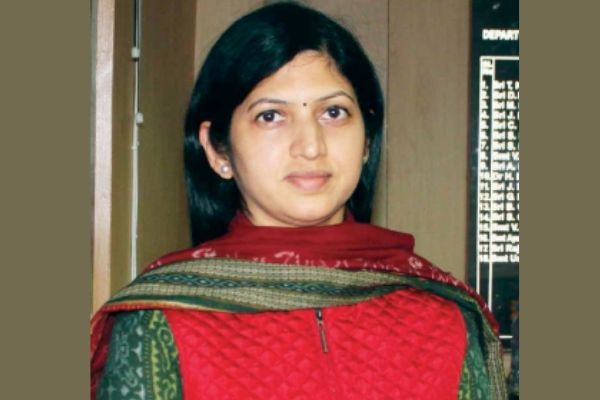
“Enhancing GER at elementary level, ensuring quality and addressing the issues related with the retention – especially of ST children, is key to achieving the educational goals,” says Usha Padhee. In conversation with Mohd Ujaley
The State Govt. has taken many initiatives for addressing the issues related with the retention of ST children and enhancing the GER. You have been the District Magistrate of Dhenkanal. What are the major challenges you see in the administration which is becoming more and more complex as people’s expectations from the government keep rising?
As civil servant, we get exposure to various types of challenges. But there is also a certain amount of diversity that this job brings and that leads to an enriching experience. We have to agree that the administration is becoming more complex. One has to have effective strategies to deliver services to the needy. Visualizing the challenges, planning and implementation, needs specific skills, which have to be acquired by the Civil Servant to be relevant and useful in the system. At the same time to ensure ethical governance, the officer should adopt ethical behavior and demonstrate it by being the role model. Changing scenario and short tenures are an impediment in bringing tangible reforms. One tries to overcome all the challenges through high ethical behavior, skills, and effective strategies for efficiency.
You are looking after the School and Mass Education department. What steps are you taking for promoting value education in your schools?
Many of us talk about deterioration in quality of education more so in value education. The national curriculum framework envisages the creation of a system for integral education emphasis is put on ensuring that the child is able to develop a holistic personality. The T School & Mass Education Department has taken up many training programmes including leadership and motivational modules to encourage the teachers to take up desirable learning systems in the classrooms.

Also Read: Emphasis on Power Generation and Transmission
Odisha has one of the largest tribal populations. There are credible reports available which suggests that their Gross Enrolment Ratio (GER) is comparatively low across India. How is your department addressing this challenge?
The largest tribal population district of the State is in Malkangiri and Mayurbhanj. Malkangiri district has 57.4 percent of tribal population to the total population. GER for both the places is above 100. The GER at elementary education of Malkangiri district is 102.23 and in Mayurbhanj district it is 107.59. Similarly, the GER of ST at elementary level is 104.26 in comparison to the overall GER of 100.56.

Teacher training• 20 Days teachers training is provided to all in-service teachers of elementary schools of the State |
Do you think that retention is a big challenge?
Of course, retention is a big challenge. The State Government has taken many initiatives for addressing the issues related with the retention of ST children and enhancing the GER. We have developed State Policy for Multilingual Education (MLE). Mother tongue based education is operational in 544 schools covering 61 blocks of Odisha in 10 tribal languages like Saura, Kui, Kuvi, Munda, Koya, Bonda, Santhali, Juang, Kisan, Oram in 8 districts namely Raygada, Gajapati, Kandhamal, Mayurbhanj, Malkangiri, Keonjhar, Sambalpur and Sundergarh. And, we are also up scaling of nine more languages (Gadaba, Bhumij, Ho, Gondi, Desia, Kharia, Didayi, Binjhal, Mahali) covering 4 more districts proposed and will be implemented during 2013-14.
Gross Enrolment RatioBridging the gap between quality and quantity is very important. In Odisha, the Gross Enrolment Ratio is 100.56 as per District Information System for Education (DISE) 2012-13. It was 101.32 at Elementary level as per DISE 2011-12. To enhance the GER at elementary level government has taken various steps such as – • Textbooks provided to all students from Class-I to VIII. • Uniforms are provided to all Girls and Boys belonging to SC/ST/BPL categories studying in Govt. Elementary Schools. • Facilitating mother tongue based education for children belonging to tribal community from class I to V. This is an innovative policy initiative, unique to Odisha. • School Student Helpline established with a toll free number 1800-34567-22 as a part of redressal of grievance mechanism. • Learning materials in tribal languages for pre-primary(New Arunima) prepared and provided to Anganwadi centers of the State in collaboration with Women & Child Development Deptt. • Child friendly school environment creating scope for encouraging child participation in classroom process. • Library and library-books are provided to all schools. • Summer camp for addressing problems of children belonging to disadvantaged group. • Residential hostelsfor urban deprived children established. • Seasonal hostels have been set up to address the children of migrant families. |
Often it is found that female children are unable to have as many opportunities for education and growth as the male students. How do you address this problem?
Honestly speaking gender bias is seen at many levels in India. Through, the degree varies. It also depends on the attitude of the decision makers at the higher levels. Due to patriarchal system the numbers of women in public services are limited. This is also reflected in the number of lady officers available in the civil services. True, sometimes it becomes stereo type to keep the lady officers in identified Departments like W &C.D, Education, Health or some social sectors. However, times are changing and minds are opening up. I hope in near future you will see women officer in the top echelons
Be a part of Elets Collaborative Initiatives. Join Us for Upcoming Events and explore business opportunities. Like us on Facebook , connect with us on LinkedIn and follow us on Twitter, Instagram.











